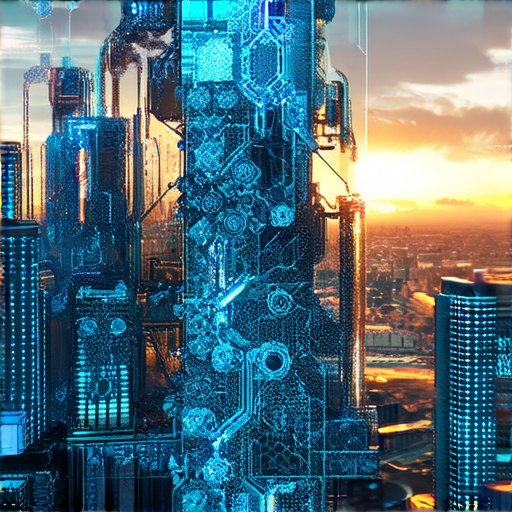The rapid evolution of artificial intelligence has led to numerous groundbreaking applications across various industries, transforming the way we live, work, and interact with one another. From enhancing productivity and organization to revolutionizing healthcare and finance, the latest AI applications are poised to reshape the future of human civilization. As we navigate this exciting landscape, it becomes increasingly important to explore the latest developments in AI, identify emerging trends, and assess their potential impact on society.

The Latest Applications of Artificial Intelligence
In recent years, artificial intelligence has made tremendous strides in various industries, transforming the way we live and work.
- Healthcare: AI is being used to diagnose diseases more accurately and quickly, personalize treatment plans, and streamline clinical workflows.
- Finance: AI-powered systems are being used to detect fraud, manage risk, and optimize investment portfolios.
- Education: AI is being used to create personalized learning experiences, automate grading, and provide real-time feedback to students.
- Transportation: AI is being used to develop self-driving cars, improve traffic management, and reduce congestion.
- Energy: AI is being used to improve energy efficiency, predict energy demand, and optimize renewable energy sources.
- Government: AI is being used to improve public safety, detect crime, and provide citizen services.
Emerging Trends in AI
Some of the emerging trends in AI include:
- Explainable AI: AI systems that can explain their decisions and actions in a transparent and interpretable manner.
- Edge AI: AI systems that run on edge devices, such as smartphones and smart home devices, rather than in the cloud.
- Transfer Learning: AI systems that can learn from one task and apply that knowledge to another task.
- Reinforcement Learning: AI systems that learn through trial and error, receiving rewards or penalties for their actions.
Real-World Applications of AI
AI is being used in many real-world applications, including:
- Virtual Assistants: AI-powered virtual assistants, such as Siri and Alexa, are being used to control smart homes and provide information to users.
- Chatbots: AI-powered chatbots are being used to provide customer support and answer frequently asked questions.
- Image Recognition: AI-powered image recognition systems are being used to identify objects and people in images.
- Natural Language Processing: AI-powered NLP systems are being used to analyze and understand human language.
Conclusion
In conclusion, AI is being used in many exciting and innovative ways, transforming industries and improving lives. As AI continues to evolve, we can expect to see even more amazing applications and uses in the future.
Top Trending AI Apps
As a leading platform for AI-powered applications and tools, we’re excited to share our take on the current top trending AI apps.
- Google Assistant: As a leader in the AI space, Google Assistant is considered to be one of the most advanced virtual assistants of its kind on the market. Using natural language processing, it supports both voice and text commands, and can handle everything from internet searches to voice-activated control of other devices.
- Chatbots: Chatbots have become increasingly popular in recent years, with many businesses leveraging them to enhance customer service and support. Some notable examples include ManyChat, Dialogflow, and Rasa.
- Cybersecurity Tools: With the rise of AI-powered threats, cybersecurity tools have become essential for protecting against malware, phishing attacks, and other online dangers. Some top-rated options include Malwarebytes, Norton Antivirus, and Kaspersky.
- AI-Powered Productivity Tools: From email management to project organization, AI-powered productivity tools are revolutionizing the way we work. Some standout examples include Grammarly, Trello, and RescueTime.
- Virtual Event Platforms: With the shift towards remote work and virtual events, platforms like Zoom, Skype, and Google Meet have become indispensable for connecting with colleagues, clients, and customers worldwide.
- Personalized Recommendation Engines: Personalized recommendation engines like Netflix, Amazon, and Spotify use AI algorithms to suggest tailored content based on individual preferences and viewing habits.
- Language Translation Tools: Language translation tools like Google Translate, Microsoft Translator, and iTranslate enable seamless communication across languages and cultures.
- Healthcare Analytics Platforms: Healthcare analytics platforms like IBM Watson Health, Athenahealth, and Epic Systems utilize AI to analyze medical data, identify patterns, and inform treatment decisions.
- Financial Planning Tools: Financial planning tools like Mint, Personal Capital, and YNAB (You Need a Budget) employ AI to track expenses, create budgets, and offer investment advice.
- Marketing Automation Software: Marketing automation software like HubSpot, Marketo, and Pardot automate repetitive tasks, personalize customer experiences, and optimize marketing campaigns.
- Customer Service Chatbots: Customer service chatbots like Freshdesk, Zendesk, and Salesforce Einstein use AI to respond to customer inquiries, resolve issues, and provide personalized support.
- Content Generation Tools: Content generation tools like WordLift, Content Blossom, and Article Forge utilize AI to create high-quality content, including articles, social media posts, and product descriptions.
- Image Recognition Software: Image recognition software like Clarifai, Google Cloud Vision API, and Amazon Rekognition enable businesses to classify, categorize, and analyze visual data.
- Speech Recognition Technology: Speech recognition technology like Dragon NaturallySpeaking, Apple Dictation, and Google Voice Typing allows users to convert spoken words into written text.
- Predictive Maintenance Software: Predictive maintenance software like Predii, Augury, and Uptake uses AI to forecast equipment failures, reduce downtime, and optimize maintenance schedules.
- Supply Chain Optimization Tools: Supply chain optimization tools like Manhattan Associates, JDA Software, and SAP Ariba employ AI to streamline logistics, predict demand, and minimize costs.
- Environmental Monitoring Systems: Environmental monitoring systems like Sense, Awair, and Purple Air use AI to track air quality, detect pollutants, and alert users to potential health risks.
- Smart Home Automation Systems: Smart home automation systems like Samsung SmartThings, Apple HomeKit, and Google Home use AI to control lighting, temperature, security, and entertainment systems.
- Autonomous Vehicles: Autonomous vehicles like Waymo, Tesla Autopilot, and Cruise use AI to navigate roads, recognize obstacles, and make real-time decisions.
- Robotics and Machine Learning Platforms: Robotics and machine learning platforms like NVIDIA Deep Learning SDK, TensorFlow, and PyTorch enable developers to build intelligent robots, drones, and autonomous systems.
- Biometric Authentication Systems: Biometric authentication systems like Face ID, Touch ID, and fingerprint readers use AI to verify identities, secure transactions, and protect sensitive data.
- Medical Imaging Analysis Software: Medical imaging analysis software like Zebra Medical Vision, Aidoc, and Caption Health employs AI to diagnose diseases, detect anomalies, and guide treatment decisions.
- Education Platforms: Education platforms like Coursera, Udemy, and edX use AI to personalize learning experiences, recommend courses, and provide adaptive assessments.
- Travel Planning Tools: Travel planning tools like Skyscanner, Expedia, and TripAdvisor use AI to suggest destinations, book flights, and recommend accommodations.
- Food Delivery Services: Food delivery services like Grubhub, Uber Eats, and DoorDash use AI to optimize routes, predict demand, and personalize recommendations.
- Home Security Systems: Home security systems like Ring, Nest, and August use AI to detect intruders, alert authorities, and provide real-time video surveillance.
- Wearables and Fitness Trackers: Wearables and fitness trackers like Fitbit, Garmin, and Apple Watch use AI to monitor vital signs, track activity levels, and provide personalized coaching.
- Virtual Reality (VR) and Augmented Reality (AR) Platforms: Virtual reality (VR) and augmented reality (AR) platforms like Oculus, Vive, and ARKit enable immersive experiences, interactive storytelling, and innovative training simulations.
- Blockchain and Cryptocurrency Platforms: Blockchain and cryptocurrency platforms like Bitcoin, Ethereum, and Ripple use AI to secure transactions, facilitate peer-to-peer exchanges, and enable decentralized governance.
- Internet of Things (IoT) Devices: Internet of things (IoT) devices like smart thermostats, smart lights, and smart locks use AI to optimize energy consumption, enhance convenience, and improve safety.
- Automated Customer Service Chatbots: Automated customer service chatbots like Intercom, Drift, and Conversica use AI to engage customers, answer questions, and resolve issues in real-time.
- Personal Finance Management Tools: Personal finance management tools like Quicken, Mint, and Personal Capital use AI to track expenses, create budgets, and offer investment advice.
- Marketing Automation Software: Marketing automation software like Marketo, Pardot, and HubSpot use AI to automate repetitive tasks, personalize customer experiences, and optimize marketing campaigns.
- Customer Relationship Management (CRM) Systems: Customer relationship management (CRM) systems like Salesforce, HubSpot CRM, and Zoho CRM use AI to manage contacts, track interactions, and analyze sales performance.
- Project Management Tools: Project management tools like Asana, Trello, and Basecamp use AI to assign tasks, set deadlines, and track progress.
- Time Tracking Software: Time tracking software like Harvest, Toggl, and Clockify use AI to monitor work hours, calculate payroll, and optimize resource allocation.
- Expense Reporting Tools: Expense reporting tools like Expensify, Concur, and QuickBooks use AI to track receipts, categorize expenses, and simplify reimbursement processes.
- Inventory Management Software: Inventory management software like TradeGecko, Zoho Inventory, and Skubana use AI to track stock levels, predict demand, and optimize supply chains.
- Order Fulfillment Systems: Order fulfillment systems like ShipStation, ShippingEasy, and Ordoro use AI to streamline shipping, track packages, and provide real-time updates.
- Return Merchandise Authorization (RMA) Software: Return merchandise authorization (RMA) software like RMA Express, ReturnLogic, and AfterShip use AI to process returns, issue refunds, and prevent losses.
- Customer Feedback and Review Management Tools: Customer feedback and review management tools like ReviewTrackers, AskNicely, and Medallia use AI to collect feedback, analyze sentiment, and drive improvements.
- Employee Engagement and Retention Platforms: Employee engagement and retention platforms like Culture Amp, 15Five, and Lighthouse use AI to measure employee satisfaction, identify trends, and develop targeted interventions.
- Learning Management Systems (LMS): Learning management systems (LMS) like Canvas, Blackboard, and Moodle use AI to personalize learning experiences, recommend courses, and provide adaptive assessments.
- Virtual Event Platforms: Virtual event platforms like Hopin, BigMarker, and Whova use AI to host webinars, conferences, and trade shows, and provide real-time engagement analytics.
- Online Community Building Platforms: Online community building platforms like Discord, Slack, and Circle use AI to foster connections, facilitate discussions, and provide personalized support.
- Customer Data Platforms (CDP): Customer data platforms (CDP) like Adobe Campaign, Salesforce CDP, and Treasure

The Best AI App Currently
We’ve compiled a list of the top AI apps available for iPhone and Android devices in 2024.
- 1. Llama – Developed by Meta, Llama is a highly advanced AI model capable of answering complex questions and generating human-like text. Its ability to learn and adapt makes it a valuable tool for individuals and businesses alike.
- 2. Bard – Owned by Google, Bard is a conversational AI that can engage in discussions, answer questions, and even create art. Its vast knowledge base and creative capabilities make it a popular choice among users.
- 3. Claude – Created by Anthropic, Claude is a cutting-edge AI model that excels in language understanding and generation. Its ability to reason and respond to complex queries makes it a valuable asset for those seeking AI assistance.
- 4. Character AI – Developed by Character.ai, this AI app allows users to converse with virtual characters, each with its own unique personality and traits. Its immersive experience and realistic interactions make it a standout in the AI app market.
- 5. Samba TV – A pioneer in AI-powered television experiences, Samba TV offers a range of innovative features, including personalized recommendations and interactive content. Its seamless integration with various devices makes it a top choice for entertainment enthusiasts.
- 6. AnyMind Group – This Japanese company has developed a suite of AI-powered tools, including chatbots, virtual assistants, and predictive analytics. Their expertise in AI-driven marketing and advertising makes them a leader in the industry.
- 7. Microsoft Azure Cognitive Services – As part of Microsoft’s Azure platform, these cognitive services offer a range of AI capabilities, including speech recognition, language translation, and image analysis. Their scalability and flexibility make them a popular choice among developers.
- 8. IBM Watson Assistant – A cloud-based AI platform, IBM Watson Assistant enables businesses to create custom chatbots and virtual assistants. Its robust features and integrations make it a trusted solution for enterprises seeking AI-driven customer support.
- 9. Dialogflow – Developed by Google, Dialogflow is a popular platform for building conversational interfaces. Its ease of use and extensive integrations make it a go-to choice for developers and businesses alike.
- 10. Rasa – An open-source conversational AI platform, Rasa offers a range of features, including intent detection, entity extraction, and dialogue management. Its flexibility and customization options make it a favorite among developers and researchers.
In conclusion, the best AI app currently depends on individual needs and preferences. Whether you’re looking for a conversational AI, a virtual assistant, or a suite of AI-powered tools, there’s something on this list for everyone.

Newest Technology in AI
I’m excited to share the latest developments in artificial intelligence, which have been rapidly advancing in recent years.
- Explainable AI (XAI): XAI focuses on making AI models more transparent and interpretable, allowing us to understand how they arrive at certain decisions. This is particularly important in high-stakes applications like healthcare and finance.
- Edge AI: Edge AI involves processing AI workloads closer to the source of the data, reducing latency and improving real-time decision-making. This is crucial for applications like autonomous vehicles and smart homes.
- Transfer Learning: Transfer learning enables AI models to adapt to new tasks and domains by leveraging knowledge gained from previous experiences. This has led to significant improvements in areas like computer vision and natural language processing.
- Reinforcement Learning: Reinforcement learning allows AI agents to learn through trial and error, interacting with their environment to optimize rewards. This has led to breakthroughs in games like Go and poker.
- Neural Architecture Search (NAS): NAS automates the process of designing and optimizing neural network architectures, leading to improved performance and efficiency.
Emerging Trends in AI
Several emerging trends are poised to shape the future of AI:
- Quantum AI: Quantum computing has the potential to revolutionize AI by enabling faster and more efficient processing of complex calculations.
- Cognitive Architectures: Cognitive architectures aim to integrate multiple AI systems into a unified framework, enabling more human-like reasoning and problem-solving abilities.
- Affective Computing: Affective computing focuses on developing AI systems that can recognize and respond to human emotions, leading to more empathetic and personalized interactions.
- Swarm Intelligence: Swarm intelligence involves coordinating the behavior of multiple AI agents to achieve complex goals, inspired by nature’s collective intelligence.
Key Players in AI Research
Some notable organizations and researchers driving AI innovation include:
These innovators are pushing the boundaries of what’s possible with AI, and I’m excited to see the impact of their work in the years to come.
What is the Strongest AI Today?
The term “strongest” can be subjective when referring to AI systems, as it depends on various factors such as application, functionality, and capabilities.
-
Humanoid Robots
-
Deep Learning Models
-
Narrow or Weak AI
Sophia, developed by Hanson Robotics, is a highly advanced humanoid robot equipped with sophisticated AI and designed to mimic human behavior and interaction.
Models like AlphaGo and AlphaFold have demonstrated exceptional abilities in playing complex games and solving protein folding problems, respectively.
Specialized AI systems like IBM Watson and Microsoft Azure Machine Learning excel in specific domains, such as healthcare and customer service.
In conclusion, determining the “strongest” AI today requires considering various aspects and applications. While some AI systems excel in specific areas, others demonstrate remarkable capabilities in broader contexts.
Top Contenders:
Key Takeaways:
- AI systems vary greatly in their strengths and weaknesses.
- Determining the “strongest” AI requires consideration of specific applications and functionalities.
- Various AI systems excel in different domains, making it challenging to pinpoint a single “strongest” AI.

The Next Big Thing in AI
We’re living in an era where artificial intelligence is rapidly transforming industries and revolutionizing the way we live and work.
- Advanced Multimodal Models: These models have the potential to integrate and process various forms of data, including text, images, audio, and video, in a more human-like manner.
- Explainable AI: As AI becomes increasingly pervasive, there’s a growing need for transparency and accountability in decision-making processes.
- Cognitive Architectures: These frameworks aim to simulate human cognition, enabling machines to learn, reason, and interact with humans in a more intuitive way.
- Edge AI: With the proliferation of IoT devices, edge AI is poised to play a crucial role in processing data closer to the source, reducing latency, and improving real-time decision-making.
- Human-AI Collaboration: As AI assumes more responsibilities, there’s a growing emphasis on designing systems that augment human capabilities, rather than replacing them.
These emerging trends hold tremendous promise for driving innovation, efficiency, and growth across various sectors, from healthcare and finance to education and transportation.
Key Players in the AI Landscape
- Google: Continues to push the boundaries of AI research, with initiatives like TensorFlow and Google Cloud AI Platform.
- Microsoft: Expands its AI offerings through Azure Machine Learning and Cognitive Services.
- Amazon: Develops cutting-edge AI technologies, including SageMaker and Rekognition.
- Facebook: Advances AI research through projects like FAIR and PyTorch.
Conclusion
The future of AI holds immense possibilities, and staying ahead of the curve requires continuous learning, adaptation, and innovation.

0 Comments